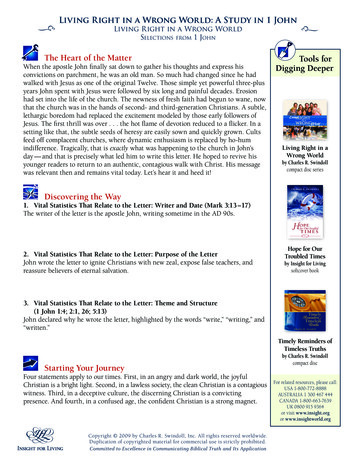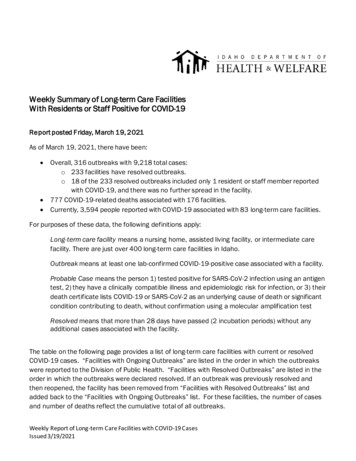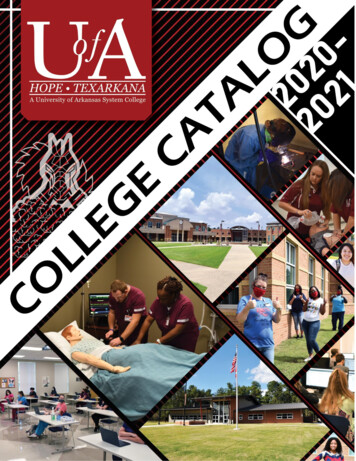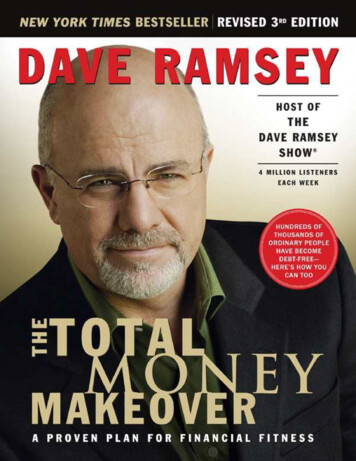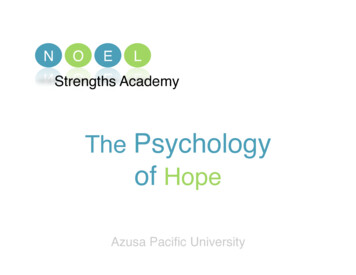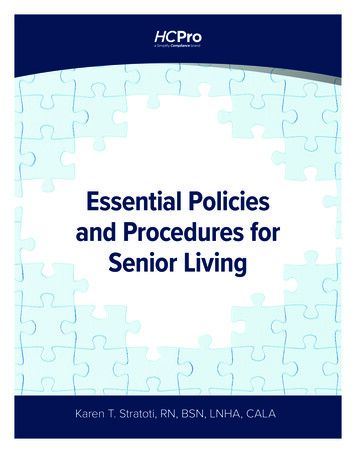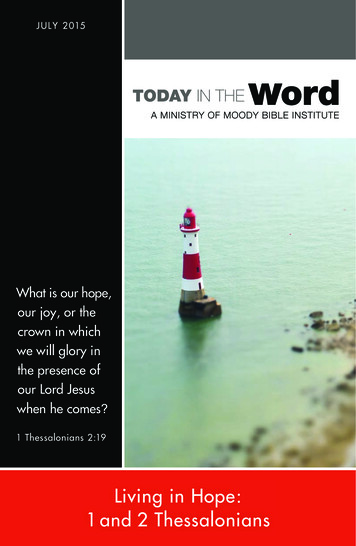
Transcription
J U L Y 2 015What is our hope,our joy, or thecrown in whichwe will glory inthe presence ofour Lord Jesuswhen he comes?1 Thessalonians 2:19Living in Hope:1 and 2 Thessalonians
FOR OVER THREE DECADESwe’ve been releasing regularinstallments of The MacArthurNew Testament Commentaryseries. With the recent releaseof Mark 1–8 and Mark 9–16 theseries is now complete. Since itsdebut, over 1.8 million readersand countless ministries havebeen enriched by this trusted series. John MacArthur isrenowned for his experience, wisdom, and insight intothe Word of God, and for his ability to explain it clearlyto all. He has faithfully dedicated hours upon hours ofcareful, scholarly work towards this project, and we arepleased to announce that it is now available—for the veryfirst time—in its entirety.
Available at your favorite local or online bookstore.Buy directly from Moody Publishers by calling(800) 867-8812 or at ShopMoodyPublishers.com.
TODAY WITH PAUL NYQUISTPresident of Moody Bible InstituteThessalonians: Living in Light of TomorrowViews of Scripturehave changeddramatically in ournation in recentdecades. It used to bethe case that manypeople, even thosewho attended churchonly sporadically or who didn’t considerthemselves particularly religious, still hadgreat respect for the Bible.Today, the opposite is true. Only one thirdof Americans believe the Bible is the literalWord of God. One in five Americans (20.6percent) say the Bible is a book of fables,a number up 41 percent since 1984. AnAmerican Bible Society survey revealedthat 26 percent of adult Americans neverread the Bible and 48 percent read it lessthan once or twice a year.Our culture doesn’t share Christian valuesand has become increasingly antagonistictoward what we believe.Without doubt, this month’s study of Paul’sletters to the church at Thessalonica is bothtimely and relevant. Paul was writing toencourage the Thessalonians to remainstrong in their faith. Thessalonica was alarge city with an estimated 200,000citizens. The city contained the principalseaport of Macedonia, making it prosperous and influential in the Roman world.Thessalonica was also known as a centerfor pagan Greek religions; some havenicknamed it “Sin City.”1-800-356-6639Paul and Timothy originally visited the churchon their second missionary journey, asrecorded in Acts 17. Thessalonica was thesecond place the gospel was preached inEurope. Many of the converts in Thessalonicawere not Jewish—this was predominantly achurch of Gentile converts.When Paul was forced to leave, he sentTimothy back with letters to the Thessalonianbelievers. Despite persecution, the Thessalonian church was prospering. The letterscontain words of encouragement, but alsowarnings about false teachers and advicefor living in the face of persecution. Paulspeaks specifically about the Day of theLord and the return of Christ.The Apostle encourages believers to livetoday in such a way that they are mindfulof the future. The emphasis is not just on theevents to come, however—our attention isfixed on Whom we serve. Our God isfaithful: “Faithful is He who calls you ”(1 Thess. 5:24). Because we serve a faithfulGod, we can be prepared for persecution.We can remain strong. We can discern falseteaching. We can avoid immorality and liveholy lives today in light of our eternal futurewith Him.We are called into God’s eternal kingdom.In 1 Thessalonians 2:12, Paul writes, “Walkin a manner worthy of the God who callsyou into His own kingdom and glory.”With this assurance, we can remaincommitted to holiness no matter howdifficult the circumstances.
THEOLOGY MATTERSby John KoesslerThe Doctrine of Last ThingsEschatology is the branch of theology thatis concerned with the end of time, the studyof last things, and particularly (though notexclusively) matters related to the return ofJesus Christ. Eschatology is a major focusin Paul’s two letters to the Thessalonians.The Bible’s teachings about the return ofChrist are meant to be a comfort to us.Paul directed the Thessalonian church to“encourage each other with these words”(1 Thess. 4:18).Unfortunately, the church’s interest in thisarea of study has sometimes been toofocused on speculation. Some have tried touse what the Bible says about eschatologyto pinpoint the exact time when Christ willreturn. Believers are also divided in theirviews on the subject, and there is muchthat we don’t know about the end of allthings. Jesus warned His disciples that thetimes and dates have been set by theFather’s own authority. The details havenot been given to us.But Scripture gives us enough informationregarding the end to help those who aregrieving (1 Thess. 4:13). The hope of Christ’scoming is a powerful incentive for godlyliving (Luke 21:34; 1 John 2:28; 3:2–3).We should not be surprised that peopledisagree about the events surroundingChrist’s return. Even in the days of theApostles, people had different opinionsabout events at the end of time. Peterwarned that as the day approaches, moreand more people will grow skeptical aboutChrist’s return and misinterpret the reasonfor the apparent delay (2 Peter 3:3–4). Hetells us the reason Christ has not alreadyreturned: so that others may come torepentance (2 Peter 3:9).General eschatology focuses on the eventsassociated with Christ’s Second Comingand the establishment of His kingdom.Personal eschatology focuses on whathappens to someone after death and atthe judgment. The biblical teachingsregarding the resurrection of the body andfinal judgment both fall under the categoryof personal eschatology. Paul links theresurrection of believers to the reality thatthey will be gathered to Christ (1 Thess.4:15–17; cf. 1 Cor. 15:23). Bodily resurrection is the capstone of the believer’sredemption (Rom. 8:23). In this finaltransformation our perishable body willbe replaced with one which is immortal(1 Cor. 15:54).The overall theme of biblical eschatology ishope. General eschatology concerns itselfwith the “blessed hope—the appearing ofthe glory of our great God and Savior,Jesus Christ” (Titus 2:13). Personal eschatology is concerned with “the hope of theresurrection of the dead” (Acts 23:6).For Further StudyTo learn more about eschatology, read Understanding End Times Prophecy:A Comprehensive Approach by Paul Benware (Moody Publishers).www.todayintheword.com
FROM THE EDITORSby Paul CurrieSeeking God TogetherGreetings Today in the Word readers! I amhonored to serve you as executive editor.And I want you to know it is our desire atToday in the Word to encourage you tospend time with Jesus each day in God’sWord. Spending time reflecting andpraying how we can submit ourselves toHis will each day. A time of praising Himand asking for His help with our daily lives.And then the Lord patiently and gentlyreminding us that “All you need is found inMe.” I’m reminded of the chorus of “LifeLove & Other Mysteries” by Point of Grace,which states:You are Lord of life, love andother mysteriesYou know my futureYou know my historyI find in You all I ever need to knowAbout life and love and othermysteries.How true that is! God knows everythingabout us. As it says in Jeremiah 29:11, “‘ForI know the plans I have for you,’ declaresthe LORD, ‘plans to prosper you and not toharm you, plans to give you hope and afuture.’” He has plans for us! Isn’t thatexciting? We can talk to Him aboutanything. We can ask Him questions aboutanything. He has already providedanswers for us in His Word. Let’s continue toseek answers to life’s mysteries together inGod’s Word!I also want to take this opportunity toshare my appreciation for YOU, ourreaders, for your faithful prayers andfinancial support. We are so grateful toreceive letters from you and discover howToday in the Word is being used in yourrelationship with God. From time to timewe include your feedback in an issuebecause we know that sharing ourexperiences encourages and remindsother readers that they are not alone aswe are seeking God together in His Word!Summer is the season when many of us are able to get away and enjoy sometime on vacation. Don’t forget to take your Today in the Word with you when yougo! If you happen to forget and have Internet access, you can always read itonline or have each day’s devotional sent to your email inbox for free atwww.todayintheword.com.1-800-356-6639
VOLUME 28 ISSUE 7EXECUTIVE EDITORPaul B. CurrieMANAGING EDITORHeather MoffittASSOCIATE EDITORLiving in Hope: 1 and 2 ThessaloniansElena MafterCONTRIBUTING EDITORSJohn KoesslerJamie JanoszWRITERJohn Koessler1-800-DL MOODY (356-6639)www.moodyglobal.orgPRESIDENTJ. Paul NyquistPROVOSTJunias VenugopalEXECUTIVE VICE PRESIDENTAND CHIEF OPERATINGOFFICERSteven MogckSENIOR VICE PRESIDENTGreg R. ThorntonCHIEF FINANCIAL OFFICERKen HeulittVICE PRESIDENTSLarry DavidhizarJim ElliottBruce EverhartChristine GorzJohn A. JelinekCollin G. LambertFrank W. Leber Jr.Paul SanthouseJames SpencerJanet StivenDebbie ZelinskiTRUSTEE CHAIRMANJerry B. JenkinsTRUSTEESChristopher DenisonT. Randall FairfaxThomas S. FortsonManuel GutierrezJ. Paul NyquistBervin C. PetersonDavid SchipperJulianna SlatteryPaul Von TobelMark WagnerRichard E. WarrenRichard YookTRUSTEE EMERITUSPaul JohnsonIn 1976, well-known theologian, pastor, and philosopherFrancis Schaeffer published a book with a title, HowShould We Then Live? that resonated with many Christians of the day. The book pondered the development ofWestern culture from ancient Rome to the present andsearched to answer existential questions of the 20thcentury. But Christians already had the answer to thequestion posed in the title. The answer came from anotherfamous theologian, pastor, and philosopher in the 50s—two thousand years earlier, in the 50s of the 1st century.Two small books of the New Testament, 1 and 2 Thessalonians, written by the apostle Paul to the believers in theMacedonian port city of Thessalonica, tell Christians howto live, no matter the century or the country. As we study1 and 2 Thessalonians this month in Today in the Word,we’ll see that the issues they struggled with are similar toours, and the gospel Paul preached to them makes thefoundation of our lives as well.We pray that as we look into the topics of prayer andhope, hope and love, hope and joy, hope and truth, hopeand suffering, and others this month, we’ll better understand what it means to live “by hope in our Lord JesusChrist” (1 Thess. 1:3). Your prayers and financial contributions to Today in the Word help us share this hope withmany readers. Thank you for your faithful support ofthis ministry. May we all grow in “endurance inspiredby hope”!Moody Bible Institute is the sole publisher of Today in the Word, copyright 2015 by Moody Bible Institute. All rights reserved. Please direct all Todayin the Word inquiries to Donor Resource Management, 820 N. LaSalle Blvd.,Chicago, IL 60610. Scripture taken from the Holy Bible, New InternationalVersion , NIV Copyright 1973, 1978, 1984, 2011 by Biblica, Inc. TMUsed by permission. All rights reserved worldwide. Scripture taken fromthe New American Standard Bible , Copyright 1960, 1962, 1963, 1968,1971, 1972, 1973, 1975, 1977, 1995 by The Lockman Foundation. Used bypermission. Printed in the U.S.A. Today in the Word is published monthly.Printed on 30% recycled paper.www.todayintheword.com
Read: Acts 17:1–15Wednesday, July 1A Tale of Two CitiesThessalonica was the capital of the tionaries. The situation was so tense thatprovince of Macedonia at the time. Its the believers in Thessalonica sent Paullocation made it a strategic point of and Silas to Berea by night.access for the spread of the gospel(1 Thess. 1:8). But given a choice between In Berea, Paul employed the samethe cities of Thessalonica and Berea, evangelistic strategy he had used in ThesBerea surely would have seemed like a salonica, beginning in the synagogue.better candidate to receive correspon- Paul’s usual custom was to “reason” fromdence from the apostlethe Scriptures (Acts 17:2,Paul. Berea was more17). This approach probreceptive to Paul’s mesably involved some formFor the wordsage than Thessalonica.of discussion or dialogue.of God is alivePaul and Silas came toThe Bereans were moreand active.Thessalonica after beingreceptive to the gospelimprisoned in Philippi,message than those inHebrews 4:12where they were alsoThessalonica. They listenedstripped and severelyattentively to his mesflogged (Acts 16:22–23).sage—but they were notBut interestingly, we have no record of gullible. The Bereans compared the truthsPaul sending a letter to Berea.Paul taught with the things that werewritten in the Scriptures (Acts 17:11).Paul and Silas encountered oppositionfrom Jewish religious leaders in Thessa- Unfortunately, when those who hadlonica, who grew jealous when they saw opposed Paul in Thessalonica heardthat Jews, God-fearing Gentiles, and even about what was happening in Berea,idol-worshiping pagans were embracing they came there, too, intent on stirring upthe gospel (Acts 17:2–5; cf. 1 Thess. 1:9). the crowd. As a protective measure, theThis tension led to a riot, during which believers sent Paul away to the coast. SilasPaul’s opponents accused the followers of and Timothy remained behind to followJesus of being law-breakers and revolu- up with this fledgling church.Apply the WordPray with UsPaul’s experience in both cities was a testimony tothe power of the gospel. As we begin this study ofPaul’s two letters to the Thessalonians, expect Godto reveal that power in your life. Ask Him to giveyou the same “noble” spirit that motivated theBereans so that you will receive Paul’s messagewith eagerness and will examine the Scripturedaily to understand its truth.Please join us in praying forMoody’s trustees, as they plannew ventures and projects ofMoody global outreach. We askfor the Holy Spirit’s guidance, sothat in all decisions God’s namewill be glorified.6 Moody Bible Institute
Read: 1 Thessalonians 1:1–10Thursday, July 2Stronger Than WordsPoet Emily Dickinson observed, “A word is Paul. They in turn became a model todead when it’s been said, some say. I say the believers in Macedonia and Achaiait just begins to live that day.” This is espe- (vv. 6–7). Paul gave them an example ofcially true when it comes to God’s words. holding to the word despite suffering. ThisAll words have power, but God’s words may be a reference to the opposition heconvey the power of God. The word of experienced while in Thessalonica andGod is “alive and active” (Heb. 4:12). One later in Berea.proof of this is the effect that the gospelhad on those who heardBy following Paul’s exit in Thessalonica. Despiteample, the ThessaloniansThe power of Godopposition, many in Thesbecame imitators of Christ. . . brings salvationsalonica responded toand channels of God’sto everyone whoPaul’s message with faith.love. The resulting transforThis was a work of the Holymation of their lives causedbelieves: first to theSpirit (vv. 4–5).others to take note andJew, then tocomment. In this way theirthe Gentile.The gospel’s power islives became a soundingalso demonstrated in itsboard that amplified theRomans 1:16capacity to transform thosetruth of the gospel, causingwho believe its message.it to “ring out” from ThesFor the Thessalonian Christians, faith was salonica to the surrounding regions (vv.more than a verbal affirmation of what 8–10). This was not a silent witness. Thosethey believed about Jesus; their faith was who heard about the Thessalonians’reflected in their actions. This change change in lifestyle also learned aboutwas brought about by the Holy Spirit, the gospel message that prompted it. Thebut they also needed to see someone ultimate focus of their message was Jesus,modeling this kind of life of faith. The God’s resurrected and coming Son whoThessalonians learned how to live the rescues us from the judgment to come.Christian life by observing and imitatingApply the WordPray with UsPaul’s description of the Thessalonians’ responseto the gospel helps to clarify the relationshipbetween faith and action in the Christian life.Christian living is a response to faith, not a basisfor faith. We act because we have been actedupon by God’s Spirit. We live the Christian lifebecause we are Christians, not in order tobecome Christians. Believe—and be transformed.Dr. John Jelinek, vice presidentand dean of Moody TheologicalSeminary, would appreciate yourprayers today for the seminary’sfaculty and staff and theirmission of training our studentsfor a powerful ministry inthe world.Today in the Word 7
Read: 1 Thessalonians 2:1–8Friday, July 3How to Preach the GospelMost books about preaching focus ontechnique; the same is true of many evangelistic methods, which focus on outlinesand methods. Today’s passage highlightsanother important element in the communication of the gospel by emphasizing theimportance of the preacher’s character.sion. To counter the false accusations of hisenemies, Paul appealed to the first-handexperience of his audience, noting hismotives as much as his methods. He wasnot motivated by greed, nor did he attemptto manipulate his audience by telling themwhat they wanted to hear. God’s approvalwas more important to Paul than public acclaim. His ministry inThessalonica was markedIt is true that someby loving concern andself-sacrifice. The Apostlepreach Christ outwas eager to share his lifeof envy and rivalry,with them as a demonstrabut others outtion of the message of theof goodwill.gospel.Those who tried to undermine the ministry of Pauland his companions inPhilippi and in Thessalonicadid so by attacking theircharacter, not their theology. In Philippi, Paul andSilas were falsely accusedofadvocatinglawlessPhilippians 1:15behavior (Acts 16:20–21). InThe validity of the gospelThessalonica, they accusedmessage is independentPaul and his team of defyof the messenger. The gosing the government (Acts 17:6–7). Criticism pel is still true even when the characterof Paul continued even after he was forced of those who share it is false. Yet Paul’sto flee the city by night (Acts 17:10). Paul’s opponents knew that if they couldenemies compared him to the many phi- persuade his audience to question thelosophers for hire who traveled from city to Apostle’s character and his motives, theycity and used their speaking ability to take would doubt the message as well. If wewant to be effective communicators of theadvantage of gullible listeners.good news, we need to do more than workEven though Paul did not stay long in on our technique. We need to pay attenThessalonica, he left a lasting impres- tion to our motives and our character.Apply the WordPray with UsThe three negatives in verses 5 and 6 provide ahelpful starting point for distinguishing falseteachers from true messengers of the gospel. Arethey manipulating us by telling us what we wantto hear? Do they seem to be more interested inpersonal gain than in godliness? Do they servethe church, or does the church serve them?Smooth operation of MoodyTheological Seminary inMichigan wouldn’t be possiblewithout a strong administrativesupport from Christopher Brooks,campus dean, and Paul Wilson,associate dean of studentservices. Please keep them inyour prayers.8 Moody Bible Institute
Read: 1 Thessalonians 2:9–12Saturday, July 4Working for JesusBible colleges like Moody Bible Institute hands (1 Cor. 4:12). Some criticized Pauloften distinguish themselves from Chris- for this practice (1 Cor. 9:3-7; 2 Cor. 11:7).tian colleges that focus on the liberal But in Paul’s eyes, the work of ministry andarts by emphasizing that their mission is the labor of tentmaking were two sides ofto train students for “vocational” ministry the same effort devoted to Christ.or “full-time Christian service.” This doesnot mean that paid professionals are the Paul’s motivation for working night andonly people doing ministry in the church day was love. Indeed, love shaped allor that most of the churchhis behavior toward theserves Christ on a partThessalonians. Paul caredJoin with me intime basis. Instead, it isfor the Thessalonians thesuffering, like aa helpful reminder thatway a father cares for hisministry is work.children. Normally thegood soldier ofparents provide for theChrist Jesus.For Paul serving the Lordneeds of their children, not2 Timothy 2:3involved “toil and hardthe other way around (cf.ship” (v. 9). This was true in2 Cor. 12:14).two ways: in addition tothe work of ministry, Paul also worked to Although Paul had a right to expect supsupport himself “in order not to be a bur- port from those to whom he ministered, heden to anyone.” Paul was a tentmaker, an preferred to provide for those needs byoccupation he shared with his colleagues plying a trade. This served two purposes.Aquila and Priscilla (see Acts 18:2). He It guaranteed that Paul would not be acame from a region that was famous for financial burden to the Thessalonians. Itproducing high quality materials for mak- also provided an example of the spiritualing tents and probably learned his craft value of ordinary work in a cultural confrom his father. Tentmaking was a form of text where many thought that work wasmanual labor that required the Apostle to beneath them (2 Thess. 3:9).make a living by working hard with hisApply the WordPray with UsWe sometimes separate our lives into sacred andsecular categories. Some imply that only the workthat’s done inside the church really matters; whathappens outside of “ministry” is irrelevant ormeaningless. How would it change the way youapproach your job to see it as an exercise indevotion to God? How does it enable you toprovide for others and serve Him more effectively?As we celebrate IndependenceDay today, let’s pray together forour country, its present and future.Let us ask the Lord in prayer,according to 2 Chronicles 7:14,to “hear from heaven. . . andheal [our] land.”Today in the Word 9
Read: 1 Thessalonians 2:13–16Sunday, July 5Hard of HearingElephants hear far better than humans, all who believe. Words have divine powerbut not only because of their ears. They when God is their author.have special receptors in their trunk andin their feet that allow them to pick up low- Paul used the language of tradition whenfrequency vibrations. This gives them an he described his message as somethinguncanny ability to locate rain, for instance. that the Thessalonians had “received.” TheHearing is also an important aspect of Greek word used here meant somethingChristian life. In his book The Divine Voice, that was “handed down.” Paul’s messageauthor Stephen Webbdid not originate with him.observes that ChristianityHe learned it from Christ.has an “oral” quality. “ByLikewise, the ThessalonianIf anyone hasspeaking to us, God grantsbelievers were not aloneears to hear, letus the ability to listen, andin either their hearing or inthem hear.when we are stirred bytheir suffering for that mesGod’s voice we rise abovesage. By receiving Paul’sMark 4:23the animal state and begingospel as the word ofto speak ourselves.”God they became “imitators of God’s churches inPaul was grateful to God for granting Judea” (v. 14).the Thessalonians discernment to recognize that his teaching was “not the word The opposition described in verses 15 andof men” (v. 13). This ability to “hear” Paul’s 16 is a reminder that God’s Word doesmessage had two important dimensions. not work like a magic spell. Not everyoneFirst, it involved an acknowledgement of who hears takes it to heart. Hearing mustits authority. The Thessalonian believers be combined with faith before it can haverecognized that God was the ultimate its full effect. These verses also includesource of the things that Paul preached to a sober reminder that God will hold usthem. Second, they recognized its power. accountable for what we hear. Those whoThis was the word which is “at work” in reject God’s message will be judged.Apply the WordPray with UsBefore the printing press, most people encountered God’s Word through hearing. Those whofirst received this letter probably heard it readwhen the church gathered for worship. Listeningto Scripture can provide insights that we mightmiss when we are reading for ourselves. If youhave access to an audio Bible, take some time tolisten to Paul’s letters to the Thessalonians.During your time with the Lordtoday, please uphold in prayerthe service at Moody of our chieffinancial officer, Ken Heulitt, andhis teams. May they continue tobe good stewards of theresources the Lord has given us.10 Moody Bible Institute
Read: 1 Thessalonians 2:17–20Monday, July 6Interrupted Plans and Unfulfilled DesiresAuthor J. M. Barrie observed, “The life ofevery man is a diary in which he meansto write one story, and writes another; andhis humblest hour is when he comparesthe volume as it is with what he vowed tomake it.”cannot stop God from accomplishingHis purposes.Good plans sometimes go unfulfilledbecause Satan places obstacles in ourway. Prayer that seeks God’s will andstrength should be a part of our planning,preparation, and implementation. Satanmay be able to hinder our plans, but heIn the midst of interrupted plans and unfulfilled desires, the apostle Paul was ableto maintain a kind of double vision. Hediscerned the spiritual forces at work inthe present while keeping his eye on thefinal outcome when Jesus returns in glory.The emphasis on Paul’s strong desire tosee the Thessalonians, combined with hisexplanation for not following through onthis plan, could suggest that the Apostle’sPlanning is good, but even good plans enemies used this absence against him.often unfold in unexpectThey may have pointed toed ways. This was true forPaul’s failure to return asThere is no wisdom,the apostle Paul, who hadproof of his insincerity. Perno insight, no plana strong desire to see thehaps they suggested thatThessalonians again. ThePaul had stirred up troublethat can succeedattachment Paul felt forin Thessalonica only toagainst the LORD.this church, as well as hisleave these new ChristiansProverbs 21:30distress over being “sepato face the consequencesrated” from them, is evidentalone. Satan’s interferin the language he uses inence did not shake Paul’sverse 17 through 20. He does not provide confidence in the ultimate outcome of hisspecific details about the circumstances ministry. He was fully assured that God’sthat kept him from returning to Thessaloni- gracious work in the Thessalonians wouldca, but he does make it clear that Satan provide him with an occasion to rejoice athindered his plans.Christ’s return.Apply the WordPray with UsHow are your plans coming along? You may notbe able to see the spiritual forces that affect themas clearly as Paul did, but you can be sure thatGod is greater than the obstacles before you. AskGod to make his will clear and thwart Satan’sefforts to derail you. As we seek to fulfill our plans,God often changes the path—but the ultimatedestination is sure.Thank you for keeping in prayerthe Investment Accounting teamon Moody’s Chicago campus.Your prayers can make adifference in the life ofDaphne Hussey, Marilou Logan,Andrea Palmer-Reed, andRohan McLachlan.Today in the Word 11
Read: 1 Thessalonians 3:1–8Tuesday, July 7Partners in the GospelA humorous poster sold by Despair, Inc. Timothy’s mission in Thessalonica wasmimics the motivational art displayed in threefold. First, he was sent to continue thethe workplace. It shows a runner dropping work Paul had begun by building them upthe baton in a relay race and describes in the faith. Second, Timothy was sent tothe reality of teamwork this way: “Ensur- reassure the Thessalonian believers, “soing that your hard work can always be that no one would be unsettled by theseruined by someone else’s incompetence.” trials” (v. 3). Were these Paul’s trials? OrWe chuckle (and maybe nod in recogni- was he afraid that in his absence the Thestion!) at this description,salonians would questionbut the fact is that teamsthe validity of the gospelFor we are God’sremain an important feabecause the suffering itco-workers; youture of the church’s ministry.had brought upon them?Paul’s language is inclusiveare God’s field,and probably has bothPaul often relied on the helpGod’s building.in view. Timothy was sentof others. Timothy was of1 Corinthians 3:9to reassure these youngparticular value to his minbelievers that their sufferistry. He described Timothying did not fall outside theto the Philippian church inthese words: “I have no one else like him, scope of God’s plan for them.who will show genuine concern for yourwelfare” (Phil. 2:20). Although Timothy was The third element of Timothy’s missionPaul’s protégé, today’s passage describes was to reassure Paul. Timothy’s first-handhim as a peer. Paul calls him “our brother” account of their continued faith andand a “co-worker in God’s service” (this affection was a source of encouragephrase could also be translated “God’s fel- ment to Paul in the midst of distress andlow worker”). Perhaps this was meant to persecution (v. 8). Timothy’s ministry to thefurther reassure the Thessalonians of Paul’s Thessalonians was an extension of Paul’s,continuing interest in them. Timothy was not but it was also a ministry to Paul.the second-string team. He was Paul’s mosttrusted associate.Apply the WordPray with UsIs there someone whose ministry has helped yougrow in your faith? Perhaps it is a favoriteteacher or Sunday school leader. It may be yourpastor. When was the last time you let them knowhow God has used them in your life? Write aletter, note, or email of encouragement tosomeone today to let them know that theirministry has not been in vain.Please include in your prayerstoday Dr. Junias Venugopal,provost and dean of Education.Ask the Lord to guideDr. Venugopal’s ministry atMoody and to encouragehim in his day-to-dayleadership responsibilities.12 Moody Bible Institute
Read: 1 Thessalonians 3:9–13Wednesday, July 8Prayer and HopeMost of us feel ambivalent about ourprayer life. We believe in the importanceof prayer, but we do not thi
in Paul’s two letters to the Thessalonians. The Bible’s teachings about the return of Christ are meant to be a comfort to us. Paul directed the Thessalonian church to “encourage each other with these words” (1 Thess. 4:18). Unfortunately, the church’s interest in this area of stud




